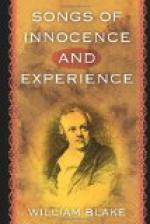|
This section contains 2,784 words (approx. 10 pages at 300 words per page) |

|
SOURCE: "William Blake: The Songs of Innocence," in Politics & Letters, Vol. 1, Nos. 2-3, Winter-Spring, 1947, pp. 9-14.
In the following essay, Bolt argues that the apparent naiveté of the Songs of Innocence is actually Blake's careful restriction of language, images, and verse techniques to create a pure "expression of innocence."
The substitution of exegesis for criticism which characterises the bulk of critical writing about the work of William Blake is only one manifestation of a misdirection of attention which has also resulted in concentration on a single fraction of his work—the Prophetic Books. In spite of their conventionally high rating the Songs of Innocence in particular have suffered from the consequent neglect of that important part of his work which the interpretive analyst regards as 'obvious', and subsequent critics have advanced no further in their approach to them than Swinburne. 'It is indeed some relief to a neophyte...
|
This section contains 2,784 words (approx. 10 pages at 300 words per page) |

|


